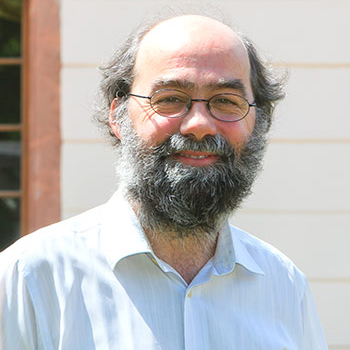Dr Christian Melsheimer
Even as a child, Christian found the topic of environmental protection exciting, having come into contact with it through researchers and role models like the conservationist and documentary filmmaker Bernhard Grzimek, and hoped he would someday be able to integrate that interest into his career. Although meteorology also fascinated him, he chose to study physics, so as to achieve a more broadly applicable degree. In the course of his studies, he specialised in the application of remote sensing (gathering data with the aid of satellites) to oceanography.
Following his studies, his desire to use remote sensing to explore the oceans would take him to Singapore, and then to the University of Bremen. Since Christian primarily concentrated on remote sensing of the polar regions, his work in Bremen soon led him to the research area sea ice.
As part of a research team, Christian is working to refine existing methods and create new ones, so as to ultimately arrive at better sea-ice maps. He’s also responsible for the information provided in the data portal at meereisportal.de. In this regard, his early contact with environmental protection is a major motivation to contribute his expertise and share his findings.
What’s the best part of your job?
Even though my work involves a great deal of sitting at a computer and programming, it’s very motivating to know that I’m doing it for the sake of climate research. It can be fascinating to extract information that’s relevant for research and society alike from raw satellite data. Another part of my work that I very much enjoy and find very important is the exchange with other researchers, which gives me the chance to work with people from all around the globe on this highly topical research area.
What do you consider to be the responsibilities of researchers like yourself, and of meereisportal.de, with regard to disseminating your findings?
My work only involves one small aspect of climate research, so I’m not exactly an absolute expert on the subject, but there are definitely alarming phenomena that call on us to take action. But before that can happen, people naturally need to know the concrete facts. As a researcher, I consider it my responsibility to share my work, and not just as part of scientific publications, but also in a way that ensures everyone can access and understand it. And of course it’s also important that the public and political community know why we do the work we do; after all, they’re who we rely on for financial support.
In your opinion, for which groups is the information on meereisportal.de especially interesting?
Anyone who wants to learn a bit about sea ice, to get to know the subject matter in more detail, or even to access concrete scientific data, has come to the right place. This can include people who are simply interested in this specific research area, or other scientists who don’t work in sea-ice research directly, but for whom sea ice is nevertheless relevant.
My personal hero is …
As a child, it was Heinz Haber, who hosted science-related television shows like ‘Stirbt unser blauer Planet?’ (Is our blue planet dying?). Back in elementary school, it was the first time I had heard of environmental protection, and it’s stuck with me ever since.

